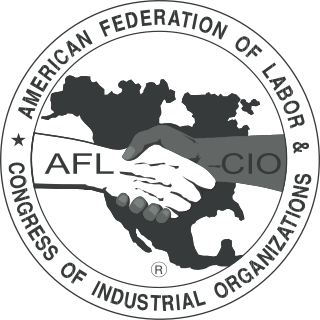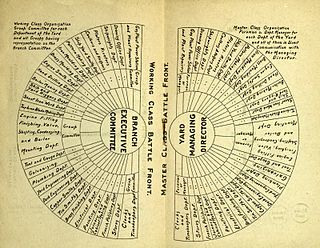See also
- Freelancers Union - A non-profit organization in the United States that represents the needs and concerns of the independent workforce through advocacy, information, and service.
Open-source unionism is a term coined by academics Richard B. Freeman and Joel Rogers to explain a possible new model for organizing workers that depended on the labor movement "taking its own historical lessons with diversified membership seriously and relying more heavily on the Internet in membership communication and servicing".
The idea was popularized in a June 2004 article for The Nation and more completely elaborated on in an earlier piece in the Spring 2002 issue of the academic journal WorkingUSA.
A trade union, often simply referred to as a union, is an organization of workers who have come together to achieve common goals, such as protecting the integrity of their trade, improving safety standards, and attaining better wages, benefits, and working conditions through the increased bargaining power wielded by solidarity among workers. Trade unions typically fund the formal organization, head office, and legal team functions of the trade union through regular fees or union dues. The delegate staff of the trade union representation in the workforce are made up of workplace volunteers who are appointed by members in democratic elections.

The American Federation of Labor and Congress of Industrial Organizations (AFL–CIO) is the largest federation of unions in the United States. It is made up of 56 national and international unions, together representing more than 12 million active and retired workers. The AFL–CIO engages in substantial political spending and activism, typically in support of liberal or progressive policies.

Industrial unionism is a trade union organizing method through which all workers in the same industry are organized into the same union—regardless of skill or trade—thus giving workers in one industry, or in all industries, more leverage in bargaining and in strike situations.
The labor history of the United States describes the history of organized labor, US labor law, and more general history of working people, in the United States. Beginning in the 1930s, unions became important allies of the Democratic Party.
Unionism may refer to:
Labor history or labour history is a sub-discipline of social history which specialises on the history of the working classes and the labor movement. Labor historians may concern themselves with issues of gender, race, ethnicity, and other factors besides class but chiefly focus on urban or industrial societies which distinguishes it from rural history.
The organizing model, as the term refers to trade unions, is a broad conception of how those organizations should recruit, operate, and advance the interests of their members, though the specific functions of the model are more detailed and are discussed at length below. It typically involves many full-time organizers, who work by building up confidence and strong networks and leaders within the workforce, and by confrontational campaigns involving large numbers of union members. The organizing model is strongly linked to social movement unionism and community unionism. The organizing model contributes to the discussion of how trade unions can reverse the trend of declining membership, which they are experiencing in most industrial nations, and how they can recapture some of the political power, which the labor movement has lost over the past century.

The Producers Guild of America (PGA) is a 501(c)(6) trade association representing television producers, film producers and New Media producers in the United States. The PGA's membership includes over 8,000 members of the producing establishment worldwide. Its co-presidents are Gail Berman & Lucy Fisher. The PGA is overseen by a National Board of Directors. Susan Sprung has served as the organization's National Executive Director since 2019.

Richard Barry Freeman is an economist. The Herbert Ascherman Professor of Economics at Harvard University and Co-Director of the Labor and Worklife Program at Harvard Law School, Freeman is also Senior Research Fellow on Labour Markets at the Centre for Economic Performance, part of the London School of Economics, funded by the Economic and Social Research Council, the UK's public body funding social science. Freeman directs the Science and Engineering Workforce Project (SEWP) at the National Bureau of Economic Research (NBER), a network focused on the economics of science, technical, engineering, and IT labor which has received major long-term support from the Sloan Foundation.

Labor unions in the United States are organizations that represent workers in many industries recognized under US labor law since the 1935 enactment of the National Labor Relations Act. Their activity today centers on collective bargaining over wages, benefits, and working conditions for their membership, and on representing their members in disputes with management over violations of contract provisions. Larger trade unions also typically engage in lobbying activities and electioneering at the state and federal level.

Day labor is work done where the worker is hired and paid one day at a time, with no promise that more work will be available in the future. It is a form of contingent work.
Community unionism, also known as reciprocal unionism, refers to the formation of alliances between unions and non-labour groups in order to achieve common goals. These unions seek to organize the employed, unemployed, and underemployed. They press for change in the workplace and beyond, organizing around issues such as welfare reform, health care, jobs, housing, and immigration. Individual issues at work are seen as being a part of broader societal problems which they seek to address. Unlike trade unions, community union membership is not based on the workplace- it is based on common identities and issues. Alliances forged between unions and other groups may have a primary identity based on affiliations of religion, ethnic group, gender, disability, environmentalism, neighborhood residence, or sexuality.
David Montgomery was a Farnam Professor of History at Yale University. Montgomery was considered one of the foremost academics specializing in United States labor history and wrote extensively on the subject. He is credited, along with David Brody and Herbert Gutman, with founding the field of "new labor history" in the U.S.
Unions have been compared across countries by growth and decline patterns, by violence levels, and by kinds of political activity.
Voluntary student unionism (VSU), as it is known in Australia, or voluntary student membership (VSM), as it is known in New Zealand, is a policy under which membership of – and payment of membership fees to – university student organisations is voluntary.
Richard Hurd is a professor of labor relations emeritus and former director of Labor Studies at the Cornell University School of Industrial and Labor Relations.
Joshua B. Freeman is a professor of history at Queens College, City University of New York (CUNY) and the CUNY Graduate Center. He is the former executive officer of the Graduate Center's history department.

Working America is the political organizing arm of the AFL-CIO. Its membership is made up of non-union individuals. It is the largest non-union workers' group in the United States, with a self-reported membership of 3.2 million individuals. Working America advocates for progressive policy issues. The organization recruits people in working-class neighborhoods on their doorsteps in an effort to persuade them to support labor-backed candidates at election time.
The Trade Union Unity League (TUUL) was an industrial union umbrella organization under the Communist Party of the United States (CPUSA) between 1929 and 1935. The group was an American affiliate of the Red International of Labor Unions. The formation of the TUUL was the result of the Communist International's Third Period policy, which ordered affiliated Communist Parties to pursue a strategy of dual unionism and thus abandon attempts at "bore from within" existing trade unions. TUUL unions aimed to organize semi-skilled and unskilled workers, many whom had been expelled from the American Federation of Labor (AFL). According to the TUUL, the AFL was "an instrument of the capitalists for the exploitation of the workers." Thus, the TUUL was formed as an organization in opposition to the AFL."
A business union is a type of trade union that is opposed to class or revolutionary unionism and has the principle that unions should be run like businesses.